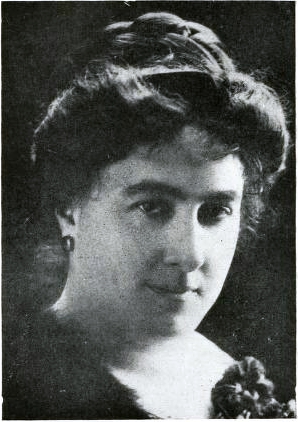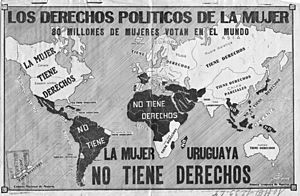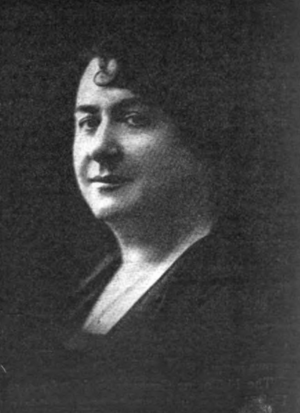Paulina Luisi facts for kids
Quick facts for kids
Paulina Luisi
|
|
|---|---|
 |
|
| Born |
Paulina Luisi Janicki
1875 Colón Department, Entre Ríos, Argentina
|
| Died | 1950 (aged 74–75) |
| Occupation | Physician, teacher, activist |
Paulina Luisi (1875–1950) was a very important leader in the movement for women's rights in Uruguay. In 1909, she made history by becoming the first woman in Uruguay to get a medical degree. She traveled a lot, representing Uruguay at big meetings for women in Latin America and Europe. She was also the first woman from Latin America to join the League of Nations, which was an early version of the United Nations. Her efforts greatly helped women across the Americas.
Contents
Early Life and Family
Paulina Luisi was born in Argentina in 1875. Her mother, Maria Teresa Josefina Janicki, had Polish family roots. Her father, Angel Luisi, was thought to have Italian family roots. Soon after Paulina was born, her family moved to Uruguay. Paulina had two sisters who also became famous. Clotilde Luisi was the first female lawyer in Uruguay. Luisa Luisi became a well-known poet.
Paulina's parents were her biggest supporters. Her mother, Maria, encouraged Paulina to follow her dreams. This was important because in the early 1900s, there were many limits on what women could do. Her father, Angel, was a teacher and believed in socialist ideas. He taught Paulina to always want fairness and freedom. Paulina carried these ideas with her throughout her life. She was always interested in making society better for everyone.
Becoming a Doctor and Teacher
Paulina Luisi earned her first college degree in 1899. She then went on to graduate from the Medical School of the University of the Republic of Uruguay. In 1908, she became the first woman in Uruguay to be a physician and a surgeon. She even became the head of the gynecology clinic at the National University in Montevideo. Gynecology is the study of women's health.
In 1907, there were only four female doctors in Uruguay, compared to 305 male doctors. As more women like Paulina joined the medical field, the number of female doctors began to grow. Paulina wrote many medical papers. She wrote about preventing diseases, staying healthy, and the rights of mothers.
How Paulina Luisi Became a Feminist
Paulina Luisi was greatly inspired by Josephine Butler. Butler was a famous English reformer in the 1800s. She fought against unfair laws and helped create the International Abolitionist Federation. This group worked to stop the terrible trade of people. Butler's work was a constant source of inspiration for Paulina.
Paulina's ideas about women's rights were also shaped by other movements. While she was still a student, a liberal feminist from Argentina named Petrona Eyle contacted her. Eyle was the president of the Universitarias Argentinas, a group for university women. She asked Paulina to join their organization. In 1907, Eyle encouraged Paulina to start a Uruguayan branch of the Universitarias. She wrote that even if there weren't many women now, they would be the start of something big.
It seems Paulina and others did join this group in 1907. Paulina also became a leader in women's rights after attending the Women's Congress in Buenos Aires in 1910. There, she met important Argentine feminists like Alicia Moreau de Justo. This conference brought together over 200 women from countries like Argentina, Uruguay, Peru, Paraguay, and Chile. It was likely here that Paulina met many future leaders of women's rights in South America. She made friends and connections that lasted for decades. Her trips to Europe also connected her with other strong women leaders.
Fighting for Women's Rights
Women's Rights in Uruguay
Before Paulina Luisi, there were no organized groups fighting for women's rights in Uruguay. However, Uruguay was already making progress with other social laws. In 1915, Paulina represented Uruguay at a big meeting called the First Pan-American Scientific Congress. There, she helped create a group called the Pan-American Women's Auxiliary. This group worked to improve the lives of women and children. After this, Paulina focused on starting women's organizations in her home country.
In 1916, Paulina, along with Isabel Pinto de Vidal and Francisca Beretervide, founded the Consejo Nacional de Mujeres (CONAMU). This was a branch of the International Council of Women in Uruguay. Paulina became the main editor of the CONAMU's newsletter, Acción Femenina (Feminine Action). The newsletter focused on women's values and equality.
In a 1917 edition, Paulina wrote her definition of feminism. She said it means that "woman is something more than material created to serve and obey man like a slave." She added that women have feelings and intelligence. She believed women should be partners and advisors to men, not their slaves. The CONAMU helped women support each other. It also focused on social issues like women's well-being, education, and fair working conditions.
Paulina was a strong supporter of working women. She created the first two female trade unions in Uruguay. These were the Telephone Operators Union and the Seamstresses from Tailor's Shops. Paulina worked with the Telephone Workers Union to get better work conditions. Thanks to her, women went from operating 100 phones to 80.
In the 1910s, many Uruguayans started to support the idea of women being able to vote. In 1919, Paulina founded the Alianza de Mujeres para los Derechos Femeninos (Women Alliance for Women's Rights). This group worked with the International Woman Suffrage Alliance. The Alianza pressured elected officials to pass laws giving women political rights. They worked with a politician named Alfeo Brum to try and get women the right to vote in local elections. This bill did not pass. Four years later, the Alianza expanded its goals to include women's economic and civil rights.
Women's Rights Across the Americas
Besides fighting for women's rights in Uruguay, Paulina Luisi also wanted to create a women's rights movement across all of the Americas. She hoped to achieve equality worldwide. She traveled to the United States hoping American feminists would help. However, she was disappointed that American women didn't seem to respect South American feminists enough. It wasn't until World War II started that Paulina again pushed for "sisterhood" between US and Latin American feminists.
Paulina's work was known and admired throughout Latin America. In 1947, the First Inter-American Women’s Conference in Guatemala honored Paulina. They recognized her as the mother of women's rights in the Americas.
Radio Femenina
Paulina Luisi also used public radio to spread her message. In the 1930s, she hosted a show on Radio Femenina, a radio station in Uruguay. On air, Paulina urged women to stay active in the movement. She believed women were the only ones who could make a difference as peacemakers. The radio helped Paulina share her ideas freely and reach people far beyond Uruguay and Argentina. Her radio presence made her a respected voice among feminists.
Later in her life, in the 1940s, Paulina encouraged women to vote in the 1942 elections in Uruguay. She wanted them to show that women deserved to be full citizens. As she grew older, Paulina became known as La Abuela, which means "the grandmother." This nickname showed how she was seen as a wise and caring leader in the women's movement.
See also
 In Spanish: Paulina Luisi para niños
In Spanish: Paulina Luisi para niños
 | Janet Taylor Pickett |
 | Synthia Saint James |
 | Howardena Pindell |
 | Faith Ringgold |



